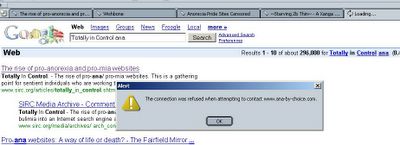Free Speech For Anorexics?

There us no such thing as free speech in America. At times, this is a good thing.
We like to think that the Internet is the ultimate, liberating, medium where all opinions and viewpoints are represented. Truly, the Web is the Wild West of ideas, or a town hall where everyone is given equal access and the public ultimately decides what information is given the most weight.
This of course, is an illusion. The Internet is not untouched by censorship, and not all ideas are given equal access to the public. In fact, for better or for worse, many efforts are being made to hide ideas deemed too dangerous for public consumption.
An example of this phenomenon comes from the New York Times on "pro-ana" Websites, which promote anorexia and bulimia as "choices" rather than as disorders, and a study by the Pediatric Academic Societies that examines them.
As Eric Nagourney put it:
Such sites are the public face of a movement that goes beyond the denial that often accompanies addictive behaviors like alcoholism and gambling, into something more like defiance.
Many of the sites dispute that anorexia and bulimia are diseases, portraying them instead as philosophies of life. They offer tips on how to lose weight - by purging, among other methods - and how to hide eating disorders from family members or friends.
Sounds pretty bad. However, not being anorexic myself, it was also interesting.
Being fascinated by the article, I was struck after reading it that no writers from pro-ana Websites were quoted, nor were any of the sites named in the article. Usually, no matter how controversial, this is standard practice for a major news outlet.
Later in the article, Nagourney writes:
But the sites remain easy to find. And some experts wonder whether they are doing a better job of getting their message out than do the sites intended to promote recovery from eating problems.
Curious about this, I decided to try to find some of these sites. It wasn't as easy as the article claimed.
The natural place to go is Google, and typing in "pro-ana websites" (as well as other search terms) I got a listing of articles critiquing them, but none that led me directly to the sites themselves.
There were quite a few Websites and blogs that talked about the phenomenon, while almost none of them providing links to the sites. One blog, the Trenchcoat Chronicles, declared its intentional avoidance of linking, and asked its readers when finding sites of this content to contact the host companies to shut them down. The authors then went to the step of deleting any future pro-anorexia comments from the blog.
One Website makes the case that these pro-ana sites should be blocked, and compared them to Websites offering instructions on bomb making. That being said however, it did name a few of the pro-ana sites.
The first direct set of links I found was on a blog post dating back to 2002 (I had no idea these sites existed back then). Two of the three links were outdated.
When doing Google searches using a Website's name, I was given articles critiquing them, rather than links to the sites themselves.

Guessing URLs now, using my Web browser, I got a message I've never seen before: "The connection was refused when attempting to contact..."
It took me a short amount of time to learn that there is in fact, a very successful effort currently under way to rid the Internet of this point of view. Many pro-ana Websites have been taken off the net entirely (the link lists some of them).
That's not to say that the content is not available on the net. Many of the sites bashing the pro-ana movement freely reprint them, while providing commentary of their own that refutes them.
Metaspider, which is a Google-like service I've never heard of, appeared to provide some pro-ana links, mixed in with other more balanced fare.
Nagourney was right, in a way, that finding pro-anorexia information on the net is possible, although I wouldn't say it's easy. It took some time and searching, but I did find links to these sites from a place called PlagueAngel.
Through it, I did find quite a number of uncomfortable and direct information on how to successfully become anorexic. One site with tips and tricks suggested people try things like "become a vegan" and "adopt a dog and feed him your food". Pretty gross.
Other sites offer "resources" for those wanting to be anorexic.
In reading some of this material, one is driven to the conclusion that not all censorship is bad. Most Americans in a post-9/11 world would agree that Internet sites with instructions on bomb making should be taken down. If information can be used to violently harm others, it can be fair game to be taken down.
Yet at the same time a builder of a bomb is trying to injure or kill others, which is not something those reading the pro-ana Websites are trying to do. They are, ultimately, hurting themselves.
One can go as far as saying they are hurting themselves along the lines of many more acceptable vices, like drug use, smoking, and alcohol. Yet corporate Internet powers like Google, Geocities, and Yahoo! are not taking down those sites, while going after the pro-ana ones.
The censorship can of worms has been opened.
So what's the appropriate line?
What else should go next?
When faced with something like a pro-anorexic Website, can you truly say that some censorship is bad?
There are no real answers.
More Politics.
RELATED LINKS:
Here's a rant on why people become anorexic.
A pro-ana web ring.
Sickly images of anorexics.
Lure Of 'Ana' Attracts Anorexics
ANRED
What is anorexia?



1 Comments:
I came by 'cuz I saw you in my referrals. I think the sites are hard to find because they get shut down all of the time. That post still gets more hits than any other post I've written in the 4+ years I've been blogging and if the search terms are any indication, a lot of them are people looking for pro-ana tips.
At the time I wrote that entry, several of the pro-ana sites I read had just been written up in various media and the owners were complaining about how they had been betrayed. Several of the sites had big notices that read, "I will not speak to you if you are part of the media!" So I think this may be why they weren't quoted in the article.
Post a Comment
|<< Home